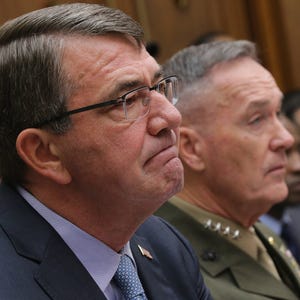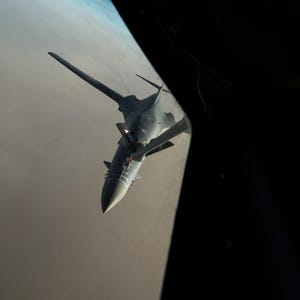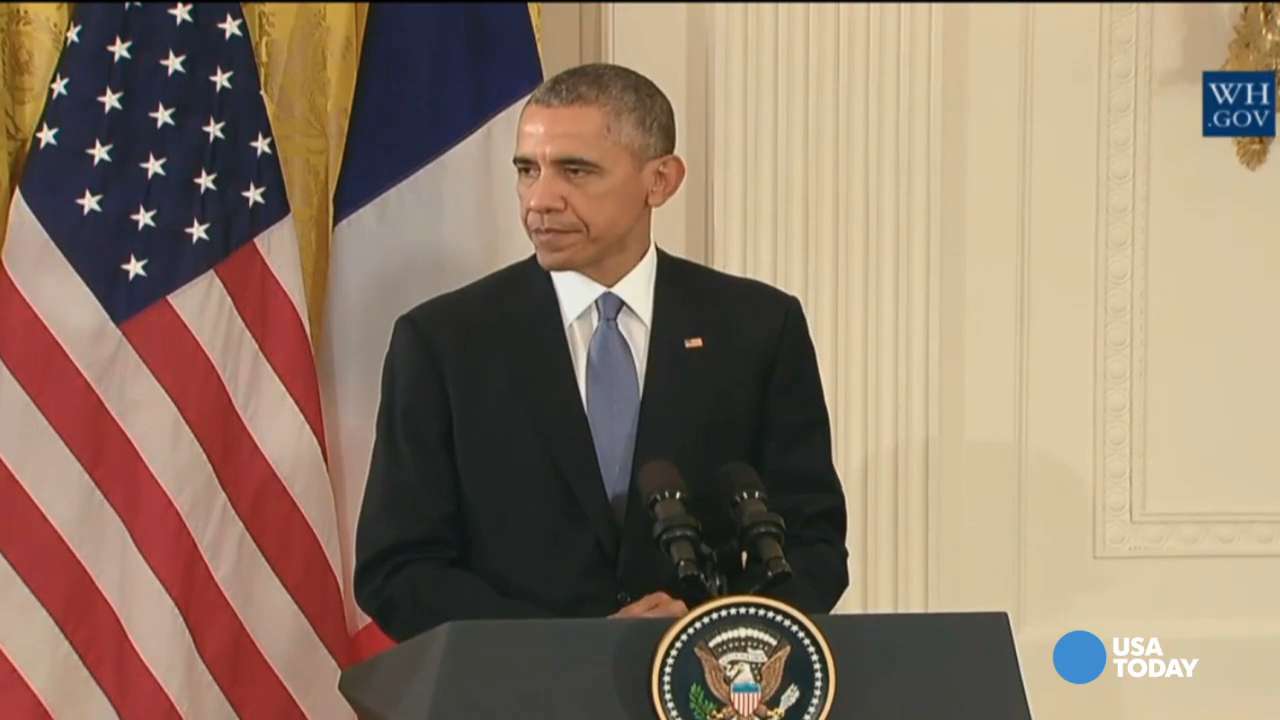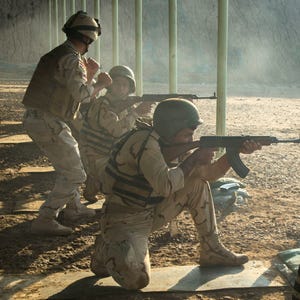Two stories from Defense News (http://www.defensenews.com)
How much you wanna bet that Republican politicians secretly want ISIS to succeed because that would mean Obama failing?
How much you wanna bet that your garden-variety Tea Partier would denounce Defense News as "a liberal rag" because it doesn't agree with what he or she wants to think is going on with ISIS?
The airstrikes have largely shut down the Deir ez-Zorfacility in Syria, which accounted for about two-thirds of the Islamic State's oil revenue, said Col. Steve Warren, the U.S. military spokesman in Baghdad. "We do believe we pretty much turned off the Deir ez-Zor oil capacity," he said.
The damage follows a month-long air campaign aimed at crippling the Islamic State's black market oil business.
The Treasury Department has estimated the Islamic State, also known as ISIL or ISIS, brings in $500 million a year from selling discounted oil on the black market. The Pentagon says about half the terror group's revenue comes from oil.
Deir ez-Zor is a major oil-producing region in part of eastern Syria controlled by the Islamic State militants.
U.S. officials acknowledge the damage to the Islamic State's revenue may not have an immediate impact on operations.
"It's not a knockout," Warren said. "It's a body blow."
Defense Secretary Ashton Carter said in congressional testimony Tuesday that refinements in intelligence allowed coalition aircraft to specifically target parts of the oil infrastructure that directly benefit the Islamic State.
Marine Gen. Joseph Dunford, chairman of the Joint Chiefs of Staff, said the aim is to prevent militants from producing and shipping oil without permanently destroying the infrastructure, so it can be restored once the civil war in Syria ends.
The air campaign is called Tidal Wave II, after the World War II air campaign aimed at destroying oil refineries in Romania to cut off oil for the Axis powers.
The U.S.-led coalition has targeted Islamic State oil infrastructure since bombing began more than a year ago, frequently hitting mobile oil refineries. But militants were able to quickly repair oil infrastructure after it was hit.
This year, Army Gen. Lloyd Austin, commander of U.S. Central Command, ordered a review of the bombing campaign to determine whether more effective targets could be developed.
Staff officers developed a broader list of targets, including well heads, oil collection points, trucks and the distribution network.
As part of the campaign, coalition aircraft destroyed 399 tanker trucks that were used to deliver black market oil, the Pentagon said. Before launching the airstrikes, the coalition dropped leaflets instructing the drivers to abandon their vehicles. To reinforce the message, aircraft dropped bombs in front of and behind the convoys.
Dunford said the drivers were not considered combatants.
Knocking out a large chunk of the Islamic State's revenue is a blow to the militants, but the group still gets much of its money from other sources, including extortion and taxing businesses and individuals in areas it controls, said Jeff White, an analyst at the Washington Institute for Near East Policy.
The coalition will continue to strike oil infrastructure to ensure militants are not able to rebuild the industry, the Pentagon said.
"You have to keep hitting them," White said. "There's a market for the oil. People are going to try and produce it."
*****
Wholesale defections, sparsely-manned checkpoints and elite foreign fighters pressed into mundane duty indicate that the U.S.-led bombing campaign and advances by Kurdish forces are eroding the forces of the Islamic State, also known as ISIL, said Army Col. Steve Warren, the top spokesman for the counter-ISIL coalition in Baghdad.
Top military officials estimate that the campaign has killed 23,000 Islamic State fighters, raising their death toll by 3,000 since mid-October. Army Gen. Lloyd Austin, who oversees U.S. military operations in the Middle East as chief of Central Command, told troops last week in Iraq that the campaign is inflicting maximum pain on the enemy, according to a military official who attended the meeting but who was not authorized to speak publicly about it.
Warren cautioned that evidence of Islamic State manpower shortages was largely anecdotal. When indicators are combined, however, they show strains on the group's fighting force, he said. Islamic State fighters continues to field about 20,000 to 30,000 fighters in Iraq and Syria, and they hold key Iraqi cities of Mosul and Ramadi, and large portions of Syria.
It's also too soon to tell if apparent strain on the group is a long-term trend, said Michael O'Hanlon, a military expert at the Brookings Institution. "I view those as provisional signs of progress," O'Hanlon said. "Individual metrics like these can be deceptive, especially given the difficulty of measuring things accurately. I'd tend to agree with CENTCOM that these anecdotes and snippets of information sound promising, but just remain a bit more skeptical until we see some more indicators and see what happens when more time passes."
Near Kirkuk in the last week, 90 Islamic State fighters laid down their arms and turned themselves over to Kurdish peshmerga forces, Warren said. The former fighters were local men who had been coerced into joining the jihadists and have grown disillusioned with the cause or simply saw a way to quit the fight by turning themselves in.
The Kurds in Syria and Iraq, backed by U.S. airstrikes and advisers, have dealt ISIL blows recently on the battlefield. A peshmerga-led attack in northern Iraq two weeks ago seized the village of Sinjar, which sits astride a key highway and supply line for Islamic State forces. Meantime, over the last few days, Iraqi security forces completely surrounded Ramadi, capturing the last bridge jihadi fighters had used for resupply.
Another sign of reduced Islamic State manpower has been found at its road checkpoints, Warren said.
Footage from surveillance drones shows fewer fighters manning those posts than in previous months.
One result has been the ability of more civilians to escape Islamic State-held territory, he said, including a group of 22 people who recently fled Ramadi. That city has been held by the jihadists after a larger force fled without a fight.
Increasingly, Islamic State forces have had to call on its better-equipped and trained foreign forces for such mundane duty as manning checkpoints, Warren said. ISIL has employed foreign fighters as its "shock troops" to seize territory and as quick-reaction forces to respond to Kurds and other coalition forces.
Austin's remarks about the number of Islamic State fighters killed are considered sensitive. The Pentagon does not release those figures because, at least publicly, it does not consider death tolls to provide a completely accurate measure of progress. The numbers also evoke the discredited "body counts" from the Vietnam War.
However, the military does keep track the toll of Islamic State dead, indicating that it does consider the death toll a useful metric. In July, officials noted that the U.S.-led bombing campaign, which began in 2014, had killed 15,000 Islamic State fighters. That number has climbed steadily to the 23,000, Austin noted last week.
Despite the heavy loss of Islamic State fighters, the terrorist group continues to replenish its ranks and has shown the ability to strike outside of the Middle East as the attack in Paris showed.







<< Home